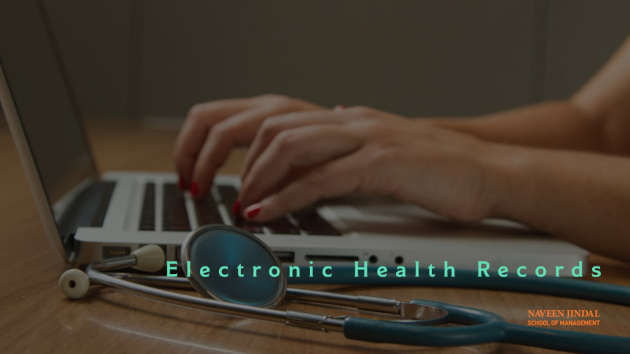Contents
- What is an electronic health record, or EHR , and what is an electronic medical record, or EMR?
- Advantages and disadvantages of EHRs/EMRs
- Jobs for EHR professionals
- Electronic health records classes
- What will you learn in the EHR Applications Class?
- Who should take the Electronic Health Records Class?
- How to find out more
The medical industry lagged behind other sectors in adopting business and information systems. It is no surprise that the earliest medical applications focused on charging and collecting for a patient’s services. They also centered on productivity improvements, automating repetitive tasks.
As the information began to grow, the need for more capable medical information systems became clear. Providers moved away from paper-based medical records and patient privacy became more critical. The advent of the federal Health Insurance Portability and Accountability Act of 1996 and other laws looked to ensure healthcare information confidentiality and security.
Finally, as part of Obamacare — the nickname given to the Patient Protection and Affordable Care Act, a comprehensive revamp of the American healthcare system signed into law by President Barack Obama in 2010 — providers were at first encouraged to adopt electronic medical records through greater reimbursements and later penalized for non-adoption through lower Medicare payments.
Today, electronic patient records are the accepted norm. The vast majority of providers and health systems utilize some form of computerized patient records. The digital versions of patients’ paper charts promise extensive benefits for personalized, safe and reliable medical care and treatment.

I am Tim Stephens. Although I am officially a member of the Information Systems faculty at the UT Dallas Naveen Jindal School of Management, I also teach many healthcare management courses. I bring over 40 years of healthcare industry experience into the classroom, and I have seen how electronic health records management has improved medical care. Here, I will explain the basics and give you a taste of what you will learn if you decide to take this path.
Let’s begin with what.
What is an electronic health record, or EHR , and what is an electronic medical record, or EMR?
Electronic medical records are digitized records of clinical services provided to a patient by a provider — a digitized copy of a patient’s medical charts.
Electronic health records are interconnected databases containing part or all of a patient’s electronic medical records. EHRs are shared with an authorized network so other healthcare professionals can access the data when necessary for clinical and analytical purposes.
EHR and EMR also have detractors and possible liabilities. Some physicians claim they ‘force’ doctors and other healthcare providers into using expensive computer systems. Clinical productivity suffers because of the amount of effort and time spent on documentation. Also, patient privacy is always a concern.
Advantages and disadvantages of EHRs/EMRs
One could conclude the advantages of computerized patient records far outweigh any possible disadvantages:
- Patient care and outcomes significantly improve with the focus on patient safety through clinical decision support.
- Documentation is clear and complete with medical imaging and test results.
- Automation lowers the chances for variation and errors.
- Theoretically, the costs associated with treating a patient are lowered by minimizing duplicate activities.
- But there are some significant disadvantages as well:
- Computer systems are typically quite expensive and complex.
- System complexity plus the learning curve of caregivers will lower overall clinical productivity, especially at the onset of implementation.
- Patient privacy is always a significant concern.
Jobs for EHR professionals
As a whole, the healthcare industry is a growing field, outpacing almost all other segments in terms of employment growth, salaries and expanding technology.
So related careers are expanding as well, along with the need for talented and knowledgeable professionals.
Clinical and caregiver careers include patient-care technicians, nurses, nurse practitioners, physician assistants and physicians. Non-clinical resource needs would include data and quality management, billing and collections, admissions, and more. Finally, there is an ever-present need for information technology professionals, with skills in system implementations and operations, data and analytics, and business processes.
Electronic health records classes
The Electronic Health Records Applications (HMGT 6327) class helps build practical experience through hands-on operations. You will work with healthcare software and study workflows in ambulatory and inpatient settings.
Long before the unprecedented challenges that COVID-19 has placed on this country’s healthcare systems, UT Dallas recognized the importance of preparing healthcare management students for the real world. We offer undergraduate, graduate and executive education programs in the Jindal School.
These programs address strategic, operational, and analytic healthcare management issues. They enable students to step into meaningful management roles quickly. Among UT Dallas’ most unique offerings is the Electronic Health Record Applications (HMGT 6327) course. Supported by UT Southwestern Medical Center. this course is an experiential class in which students utilize hands-on, practice-oriented opportunities to learn the core components of a clinical information system. Primary healthcare providers often use these systems.
Students learn concepts related to the use of electronic medical records software, using Epic EMR as an illustrative example. An essential aspect of the course is a lab-based component. Students follow guided exercises and simulated scenarios in the software.
The course includes a mix of classroom lectures, lab-based exercises, discussions and guest lecturers by senior healthcare managers and executives.
What will you learn in the EHR Applications Class?
You will develop a strong understanding of clinical and administrative workflows. You will participate in hands-on exercises, using EMR software, focusing on ambulatory, inpatient, patient registration and scheduling, and billing areas.
Also, as we have recognized since the recent virus outbreak, information systems must support the clinical management of extraordinarily difficult situations. The EHR class helps students understand this holistic approach. You will gain insights into clinical decision support and analytics and monitor the quality of care continually.
Health-insurance reimbursement consists of complex processes. You will develop an understanding of most insurance plans’ design and how the EHR supports charges, billing and reimbursements for medical services. Finally, you will learn how the clinical aspects of EMR/EHR systems interact with other information systems, such as financial, supply chain and human resources systems.
Who should take the Electronic Health Records Class?
If your professional career plans include any of the following healthcare occupations, whether clinical or business-oriented, this class would be great!
- Administrative and Clinical Management
- Business Analysts
- IT Professionals
- Supply Chain Professionals
- Clinical Staff (even MDs)
How to find out more
Please visit the MS in Healthcare Leadership and Management program webpages to learn more about the graduate healthcare management program. You also can view specific topics and details by using the UT Dallas CourseBook online search tool to review course information. Finally, email me, Tim Stephens, if you have any questions or comments.





